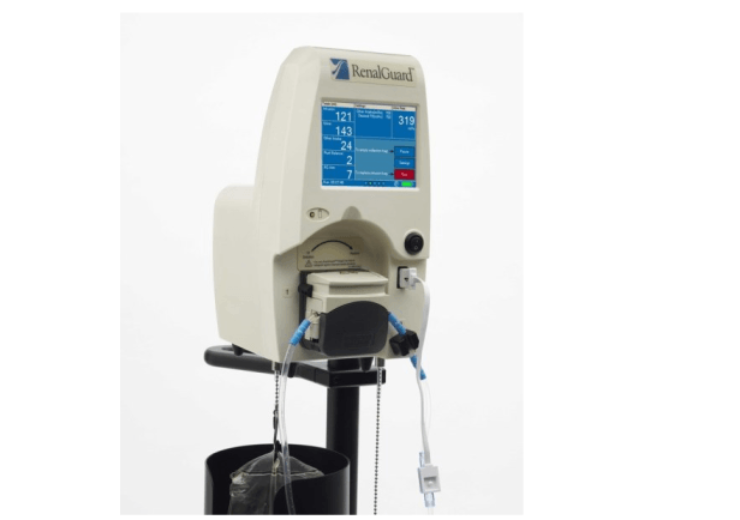AKI complicates patient recovery, adds significant recovery time and is one of the strongest predictors of in-hospital and long-term mortality after surgery

Image: Renal Guard's automated diuresis better protects at-risk patients undergoing cardiac surgery from acute kidney injury. Photo: courtesy of PRNewswire / RenalGuard Solutions.
RenalGuard Solutions, a pioneering medical device company focused on protecting patients from acute kidney injury (AKI), announced today that the KIDNEY clinical trial confirmed RenalGuard Therapy® better protects at-risk patients undergoing cardiac surgery with cardiopulmonary bypass (CPB) from Acute Kidney Injury (AKI). Results of the 220 patient, randomized trial comparing automated diuresis technology to standard hydration were presented at the American Society of Nephrology’s Kidney Week meeting held in Washington D.C., Nov. 5-10, 2019.
220 patient randomized clinical trial: at-risk patients undergoing cardiac surgery with cardiopulmonary bypass
Met primary endpoint: reduction of onset of AKI within 48 hours of surgery
Post-operative AKI rates were significantly lower in the RenalGuard group vs. controls (10% vs 20.9%)
Number needed to treat (NNT) with the RenalGuard system to reduce AKI: 9 patients
Millions of elective cardiac surgeries are performed each year worldwide, and AKI is the most common major surgical complication, reported in up to 30 percent of cases. In emergent cases, AKI rates can be twice as high, ranging from 50-70%. AKI complicates patient recovery, adds significant recovery time and is one of the strongest predictors of in-hospital and long-term mortality after surgery.
In the KIDNEY trial, patients at-risk for AKI were randomized into either a RenalGuard Therapy treatment group or a control group managed with standard-of-care hydration. Risk factors for AKI included a history of diabetes and or anemia; estimated Glomerular Filtration Rate (eGFR) < 60 ml/min/1.72m2; anticipated cardiac surgery time >120 minutes and Log EuroScore > 5. AKI was defined as a rise in serum creatinine greater than 50% in the days post-procedure.
The RenalGuard group’s post-operative AKI rates were significantly lower than the control group’s, 10% vs 20.9%. As well, the mean volumes of urine produced during surgery (2337 + 896 ml vs 766 + 557 ml) and within 24 hours post-op in ICU (3297 + 1298 ml vs 2053 + 802 ml) were significantly higher in the RenalGuard group. Median ICU stays were similar for the two groups.
RenalGuard Therapy entails the use of RenalGuard’s automated fluid management system with a physician-prescribed loop diuretic to induce high urine output rates, which protect against AKI. Used with more than 23,000 patients, the automated fluid management system is designed to measure urine output and replace it in real-time with an equal volume of sterile saline.
In addition to urine volume replacement, users can set the RenalGuard System to achieve a net fluid gain over and above matched hydration or to achieve a net fluid loss. The flexible system also allows the infusion of a bolus of fluid at the user’s request and is capable of adjusting matched hydration to take into account other fluid sources.
“The KIDNEY trial adds to a growing body of clinical evidence showing that RenalGuard Therapy is a very effective means of preventing acute kidney injury in at-risk patients,” said Dr. Howard Levin, RenalGuard Solutions’ Chief Medical Officer. “Last month, a 700+-patient, multi-center, randomized clinical trial found RenalGuard® to be superior to the POSEIDON protocol in preventing contrast-induced AKI.”
Source: Company Press Release
